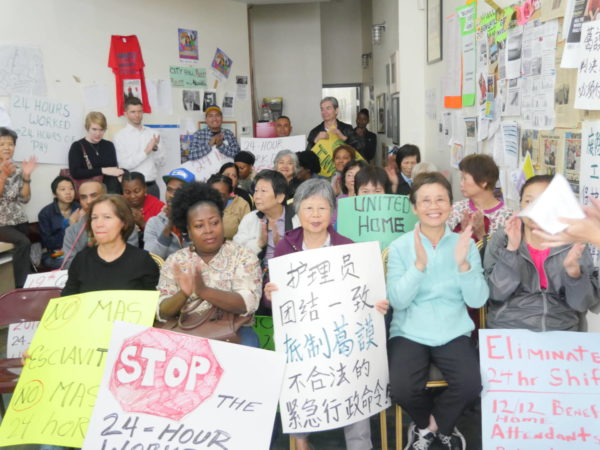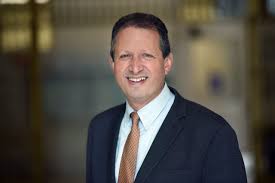NEW YORK, N.Y.—With a 2019 decision by the state Court of Appeals giving home health aides the right to claim full pay for some 24-hour shifts, several home-care agencies have agreed to settle class-action suits for alleged minimum-wage violations.

The Incare Home Health Care Group, Emanuel, and Renaissance agencies agreed to give their attendants 5½ hours in back pay for each 24-hour shift they worked in a five-year period between 2013 and 2018. The Incare workers will get $12 an hour, $66 per shift.
More than 50 similar suits have been filed in the state, says LaDonna Lusher, a lawyer representing the Incare workers. While the Court of Appeals decision sustained the state regulation that agencies only have to pay health aides for 13 hours of a 24-hour shift — they’re supposed to be off for the other 11 hours, eating or resting — it said they could claim full pay if they could prove they hadn’t gotten time to eat or to sleep for at least five uninterrupted hours.
The city’s largest home-care providers, however, have not agreed to settle, says Lusher. They include Edison Home Health Care, First Chinese Presbyterian’s program, and the Chinese-American Planning Council, whose program, licensed in 1998, serves about 3,000 people and has more than 4,000 employees.
“They owe us a lot of wages,“ said Qunxiang Ling, 75, one of about a dozen health attendants who protested outside the CPC‘s Chinatown officers September 15. Speaking in Chinese through a translator, she said she recently retired after more than 10 years of doing three or four 24-hour shifts each week.
“I couldn’t continue,” she said, pointing to her back.
On overnight shifts, the attendants have to turn the person they’re taking care of over every two hours, as well as feeding them and helping them to the bathroom, said Zhu Qin Chen, 66, also in Chinese. She’s worked four 24-hour shifts a week for the past nine years.
“They don’t even sleep sometimes,” she continued. “They sit up and watch TV. Then we have to stay up with them.”
CPC doesn’t pay aides for that extra work, she said. “I document very clearly how long I was up for,” she avers. “I reported ‘Monday night, I couldn’t sleep,’ but they ignored it.”
The workers are demanding that CPC stop the 24-hour workdays, “pay back all stolen wages of 24-hour workdays,” and apologize to the home attendants who worked those shifts, said the National Mobilization Against Sweatshops’ Ain’t I A Woman campaign, which organized the protest.
“The problem with 24-hour shifts is systemic, and the solution must be state-led,” CPC CEO and president Wayne Ho responded in a statement to LaborPress. “State-level intervention is absolutely necessary to make real, sustainable change and ensure workers are compensated for each hour worked.”
Medicare only reimburses agencies for 13 hours of pay during a 24-hour shift. CPC’s home-attendant program, Ho said, “spent $2.7 million last fiscal year that was not reimbursed by Medicaid to pay for interruptions, overtime, transportation, PPE, and training to home health aides.”
He said CPC and other home-care agencies are calling on state legislators to set aside $1 billion in Medicaid funding to end 24-hour live-in shifts and have different attendants split shifts; raise the minimum wage of home-care workers to 150% of the minimum wage in the region; and pass the New York Health Act, which would guarantee universal long-term care.
There are 11,000 24-hour live-in cases across New York State, Ho said, and CPC has 54 of them. By those figures, paying attendants $17 an hour for the now-unpaid 11 hours would cost the state about $750 million a year. If CPC settled back-pay claims on the same $66-a-shift terms as Incare, it would be owe about $6.5 million.
CPC and other unionized home-care agencies are now “in an arbitration process facilitated by 1199SEIU” to address the back-pay issue, Ho added.
1199SEIU was not able to reply by press time.
Some agencies, Lusher said, have telephone systems where attendants call in at the end of their shift and punch in codes for what duties they did, such as feeding the client or helping them to the bathroom — but those systems generally don’t include codes for working during the 11 hours they’re supposedly off.
Another issue, she said, is that workers at some agencies are supposedly represented by sketchy unions like Local 713, International Brotherhood of Trade Unions (IBOTU) and the Connecticut-based Home Health Care Workers of America — both of which claimed they had signed agreements with the employers that disputes were to be settled by arbitration.
Neither one is affiliated with the AFL-CIO, although Local 713 sometimes claims that it is. National Labor Relations Board records online show that 1199SEIU has filed at least five complaints against Local 713, with charges including “causing employer to discriminate/retaliate” and “coercion, including statements and violence.” In 2014, Local 713’s former secretary-treasurer was sentenced to six months house arrest for having the Genovese mob family threaten another union that was trying to organize workers at a Long Island chocolate factory.
“I honestly think that legislation should be passed so that these aides don’t have to work 24-hour shifts. It’s a terrible burden on them,” Lusher says. “But I think it’s even more egregious to require them to be there for 24 hours and then not pay them for all of it.”



